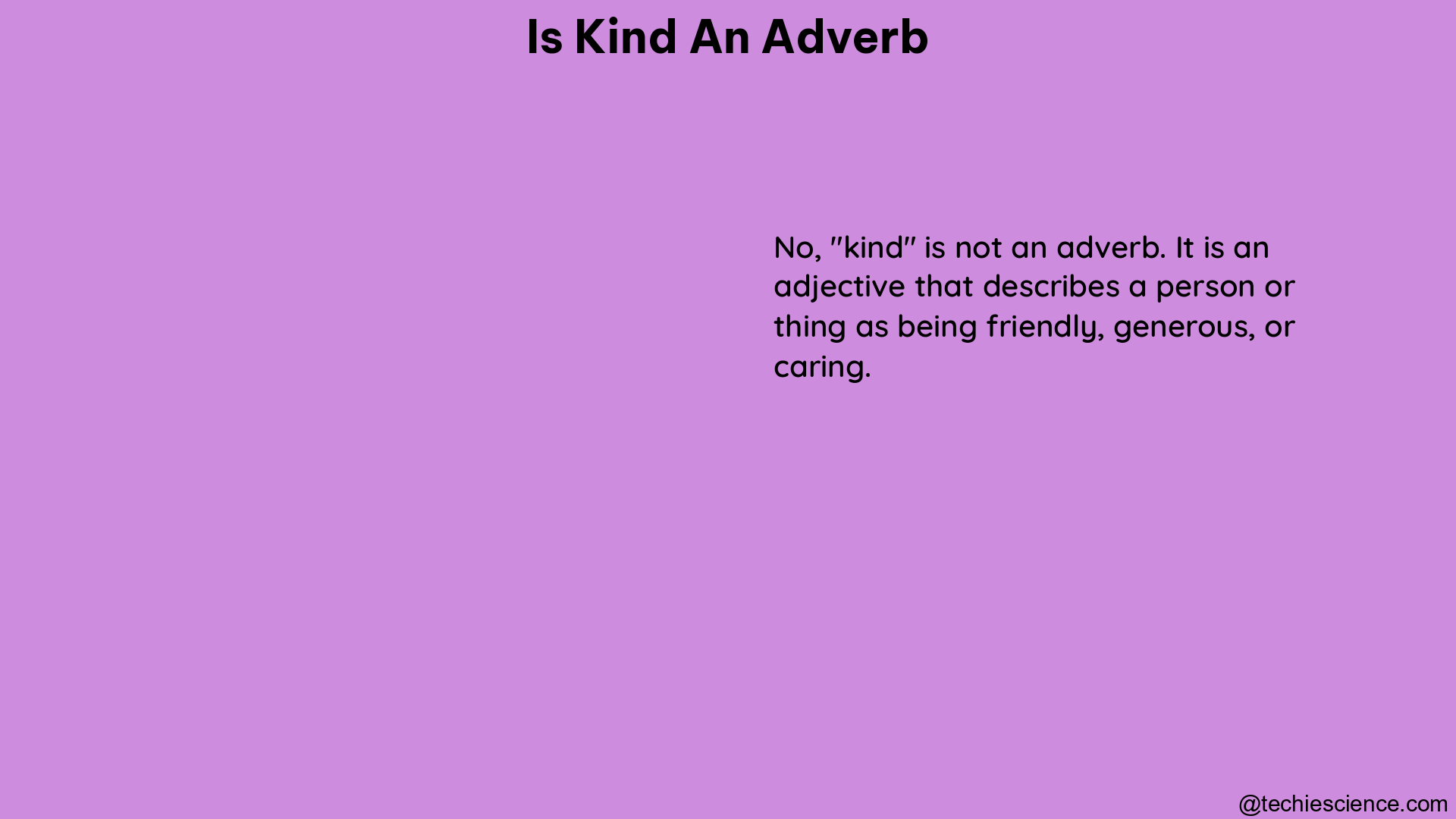Yes, the word “kind” can function as an adverb in the English language. When used as an adverb, “kind” typically implies a degree or extent, similar to words like “somewhat” or “to a certain extent.” This adverbial usage of “kind” is often observed in informal speech and writing.
Adverbial Usage of “Kind”
The adverbial usage of “kind” allows it to modify verbs, adjectives, or other adverbs, providing additional information about the degree or intensity of the action or quality being described. For example:
- “The weather was kind of cold today.”
- “I’m kind of tired after that long hike.”
- “The movie was kind of boring, but I still enjoyed it.”
In these sentences, “kind of” is used to indicate that the weather was somewhat cold, the person was moderately tired, and the movie was slightly boring, rather than using more definitive terms like “very” or “extremely.”
Grammatical Specification

Part of Speech
The word “kind” can function as different parts of speech in the English language, including:
- Adjective: “She is a kind person who always helps others.”
- Noun: “This kind of dog is very rare.”
- Adverb: “The movie was kind of scary, but I enjoyed it.”
When used as an adverb, “kind” is typically classified as an adverbial modifier, as it provides additional information about the degree or extent of the action or quality being described.
Adverbial Meaning
The adverbial usage of “kind” implies a sense of moderation or qualification, similar to words like “somewhat,” “rather,” or “to a certain extent.” This usage is often associated with informal speech and writing, as it allows the speaker or writer to express a more nuanced or tentative assessment of the situation.
Examples of “Kind” as an Adverb
Here are some additional examples of “kind” used as an adverb:
- “The weather was kind of warm for this time of year.”
- “I’m kind of interested in learning more about that topic.”
- “The new restaurant is kind of expensive, but the food is delicious.”
- “The test was kind of difficult, but I think I did well.”
- “The music was kind of loud, but it didn’t bother me too much.”
In each of these examples, “kind of” is used to indicate a degree or extent, rather than a definitive or absolute statement.
Theoretical Explanation
The adverbial usage of “kind” is often attributed to the word’s origins and evolution in the English language. The word “kind” has its roots in the Old English word “gecynde,” which meant “natural” or “innate.” Over time, the word’s meaning expanded to include a sense of “type” or “sort,” which then led to its use as a modifier to describe the degree or extent of something.
This adverbial usage of “kind” is particularly common in informal speech and writing, as it allows speakers and writers to express a more nuanced or tentative assessment of a situation. By using “kind of” instead of more definitive terms, the speaker or writer can convey a sense of uncertainty or qualification, which can be useful in certain conversational or rhetorical contexts.
Conclusion
In summary, the word “kind” can indeed function as an adverb in the English language, typically used to indicate a degree or extent of an action or quality, rather than a definitive or absolute statement. This adverbial usage is often associated with informal speech and writing, and can be a useful tool for expressing a more nuanced or tentative assessment of a situation.
Reference:
- https://www.dictionary.com/browse/kind
- https://wordtype.org/of/kind
- https://www.collinsdictionary.com/us/dictionary/english/kind

Hi…. I am Goutam Datta. I have completed a double M. A. in English and B. Ed. I am a creative writer. Currently, I am a part of the LambdaGeeks.